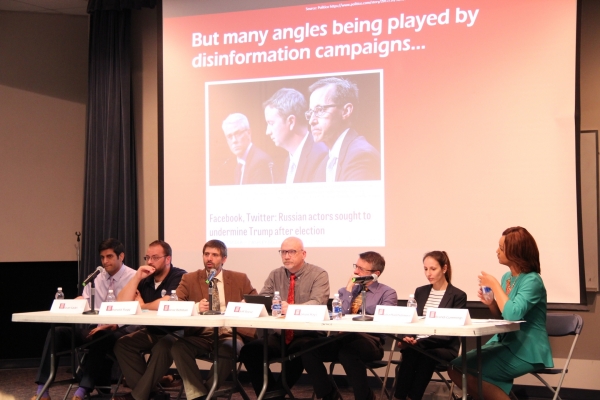Panel Discussion Explores "Fake News" Phenomenon
November 16, 2017
 "Stop Trying to Make Fake News Happen" panel
"Stop Trying to Make Fake News Happen" panel
By Carrie Anderson
When it costs next to nothing to launch and monetize a news website, how are readers to know which media outlets are trustworthy and which constitute "fake news?"
A panel of Old Dominion University and Hampton Roads media experts explored that question, and shared their experiences in crafting news stories, at the recent ODU Libraries-sponsored panel discussion, "Stop Trying to Make Fake News Happen."
Students gathered in the Mills Godwin Building Nov. 9 to hear from Brandi Cummings, of WAVY TV; Lora Hadzhidimova, an ODU graduate student in International Studies who is interested in how fake news is used as a propaganda tool; Jakon Hays and Jeff Reece, from The Virginian Pilot; Jesse Richman, an ODU associate professor of political science; Ronald Rugg, general manager of WODU; and Sean Sadri, an ODU assistant professor of communication and theatre arts.
"The topic of fake news is ever present in our lives, from breaking news about Russian interference in the 2016 presidential election to Twitter spats between elected officials and news outlets," said Giovanna Genard, assistant vice president of strategic communication and marketing at ODU, in introducing the panel.
As panelists shared stories of their research and personal experiences, it became clear how much impact the idea of "fake news" has had.
For broadcasters like Cummings, the stigma of being labeled "fake news" extends even to how video shots are set up. Cummings shared a story from a South Carolina news station where a reporter covered a story about a woman who had been held captive. The reporter used crime scene tape as a prop so it appeared she was reporting from a crime scene.
"This led to some serious conversations in our newsroom about how we go about delivering the stories that we tell. It also continued to call into question what we do. If a viewer sees this from ABC news in New York, will they believe us if we're standing in front of crime scene tape?" she said.
Panelists were unanimous in their assessment that the concept of "fake news" changed how the public perceives news, but Reece, a senior editor at The Virginian-Pilot, shared how the concept of "fake news" has also changed how he thinks about the stories he's asked to cover. He shared with the audience a pair of stories he wrote two years ago about lies that were being spread about the mayors of Norfolk and Portsmouth. The stories received significant push-back from the mayors because they repeated the lies; the Pilot staff involved didn't think it was a problem because the point of the story was to debunk the lies. Now, studies have shown that merely repeating the lie, even if you are debunking it, gives it credibility.
"What I thought was a no-brainer decision two years ago, now I would actually have to contemplate. Am I doing more harm than good in trying to set the record straight? Can I do it in a way that I don't repeat the lie? Is there a way to mitigate it? What were easy decisions just two years ago would take a lot of discussion about how we would cover it," Reece explained.
Wrapping up the panel, Sadri and Hays offered the following tips for how to be a responsible consumer of news in a "fake news" saturated world:
- Don't automatically share stories. Take the time to read and evaluate the article before sharing;
- Be aware of the concept of selective exposure, which explains that people generally seek out stories they agree with and when they find something that doesn't coincide with their beliefs, they automatically assume it's fake;
- Be wary of news sites with strange names. If you are unfamiliar with a news source, do some research before sharing;
- When friends or family share stories from fake news websites, let them know it's not real and ask them to take it down; and
- Force yourself to read websites you don't agree with to break out of your silos.
"Find stories you don't agree with. Digest them and try to understand why they are reporting stories the way they are,' Hays said. "It leads to conversations and better-informed citizens."

